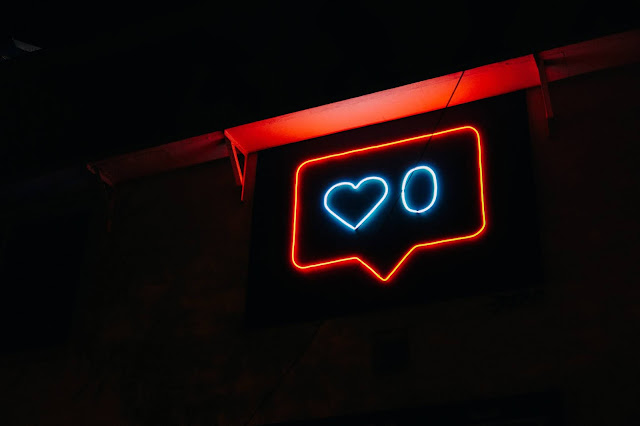Giving in Secret?
 |
| Photo by Prateek Katyal |
For Lent, my church (St. Paul's United Methodist Church) is using the theme "Again & Again: A Lenten Refrain" with art, liturgy, and other materials created by A Sanctified Art. To describe it very briefly: the theme reminds us that again & again, there is suffering and injustice, and again & again God is there. What the pastor-artists of A Sanctified art have put together is much richer than that--I'd encourage you to visit their website and social media if you're interested in hearing more.
One of the ways that we're using the art included within this theme is to practice visio divina, or divine seeing. This is a practice of reading scripture and viewing artwork as a way to meditate on the text and listen for what God might be saying to us through it. I'm leading one small group on Zoom in this practice weekly throughout Lent and we had our first one on Thursday, using the image in the Instagram post shown below. We read Matthew 6:1-6, 16-21 (text here on Bible Gateway). "And whenever you pray, do not be like the hypocrites; for they love to stand and pray in the synagogues and at the street corners, so that they may be seen by others. Truly I tell you, they have received their reward. But whenever you pray, go into your room and shut the door and pray to your Father who is in secret; and your Father who sees in secret will reward you." (Matthew 6:5-6 NRSV)
The artist, Lauren Wright Pittman, connected this idea from the text with the current phenomenon of "if you don't post on it on social media, it didn't happen." Social media has given us the opportunity to share more than ever before, and we've embraced it as a way to show what kind of people we are (or at least what we want people to think we are). I'm no different. I want to show off my cool friends, my cool stuff, my correct opinions, and appear interesting and talented. But when we're thinking about how we're going to post our lives on social media, it sets us up to miss out on being present. It can be a cheap, shiny replacement for authentic experience. Not to discount the positive aspects of social media, but the line is blurry--when do you cross from positive connection to something that makes you feel bad and sucks up too much time? And are we using social media to display conspicuous piety?
Lauren Wright Pittman's artwork depicts a person in private, praying and basking in the authentic connection with God.
My visio divina group really liked this artwork. The gothic frame around the figure, to us, represents that private space where the person is just being alone with God. When I practice visio or lectio divina (divine reading), I like to make my own artwork in response, even if it's just a doodle. I got to thinking about the alms giving part of that text: “So whenever you give alms, do not sound a trumpet before you, as the hypocrites do in the synagogues and in the streets, so that they may be praised by others. Truly I tell you, they have received their reward. But when you give alms, do not let your left hand know what your right hand is doing, so that your alms may be done in secret; and your Father who sees in secret will reward you." (Matthew 6:2-4 NRSV)
Thinking about how I give and see giving today, like our social lives, a lot of this has also moved online. Some is in secret, of course, but some is public. I can give on Facebook and everyone can see that I did. I can give to a Go Fund Me and share that I did. I can send money on Venmo and other Venmo users can see that I did. And you can check "private" or "anonymous" if you want, but maybe you don't. I might not because I want others to see and also be influenced to support the cause that I support. And I might not because I want others to see how generous I am. To see that I support the right causes.
Does it matter if it means a good cause gets money? I don't know. Maybe it's good for the cause, but not as good for me if my motivations are selfish. I don't have an answer, just a challenge to myself to examine my reasons for whatever I share online.
Here's my doodle. It's a person hunched over a computer, giving in secret. 😆
The podcast For the Wild recently had an episode with Jenny Odell, author of How to Do Nothing: Resisting the Attention Economy. She talks about how social media pulls us into the attention economy and makes it hard to step off, when it's embedded in how we communicate with our friends and it's constantly accessible through the computer in our pocket. A quote from the book How to Do Nothing: “We know that we live in complex times that demand complex thoughts and conversations - and those, in turn, demand the very time and space that is nowhere to be found. The convenience of limitless connectivity has neatly paved over the nuances of in-person conversation, cutting away so much information and context in the process.”
The whole episode is well worth a listen. (I'll be adding the book to my to-read list.)
When asked what are the ramifications to participating in this, she responded, "I think probably there's some loss of interiority [...] and sort of maintaining a space for reflection. And I think that those kinds of things are very much threatened by the sort of imperative to constantly externalize, and to some extent, advertise oneself." I resonated with this statement quite a bit. Advertising the self is a good way of describing what I explained above. My interaction with social media isn't "communicating with my friends" anymore if I'm thinking of my "audience" and calculating my presence to match a desired appearance.
Jenny Odell said in the podcast interview that what she started thinking about this topic, as a reaction to the "need to post something" was "[...] giving myself a pause and asking, like, you know, who is this for? What is this actually accomplishing? And in the last couple of months, I have been posting a lot less because I just sort of don't want to add to the noise. And I don't think that it's useful for me to do that. I think I have other ways of contributing, that are maybe not as visible, they're not as immediate, and they're not as legible, they're not as legible as a sort of action in the moment. But they're ultimately more meaningful to me." (Emphasis mine.)
Less visible, less immediate, and more meaningful to me, and perhaps to my deeper relationships with others and with God.



Comments
Post a Comment